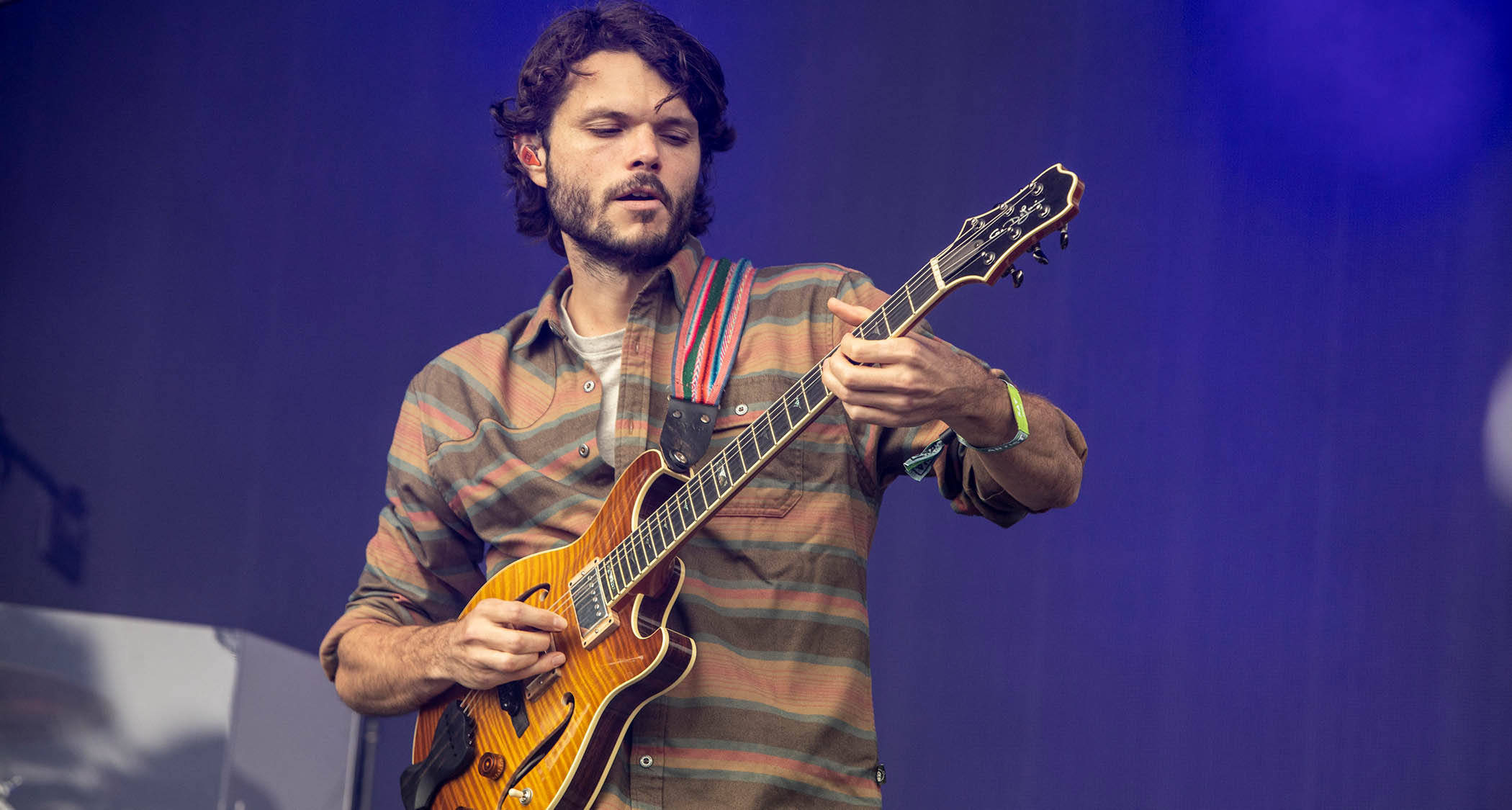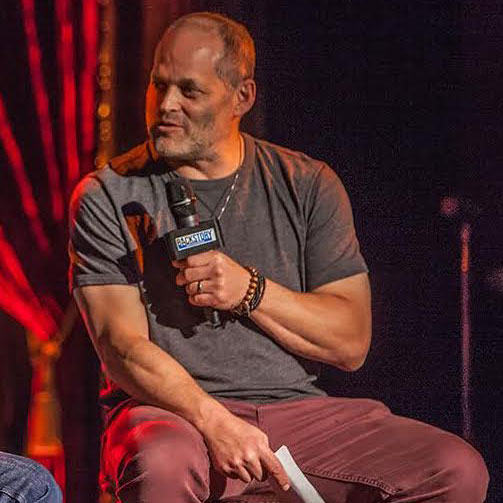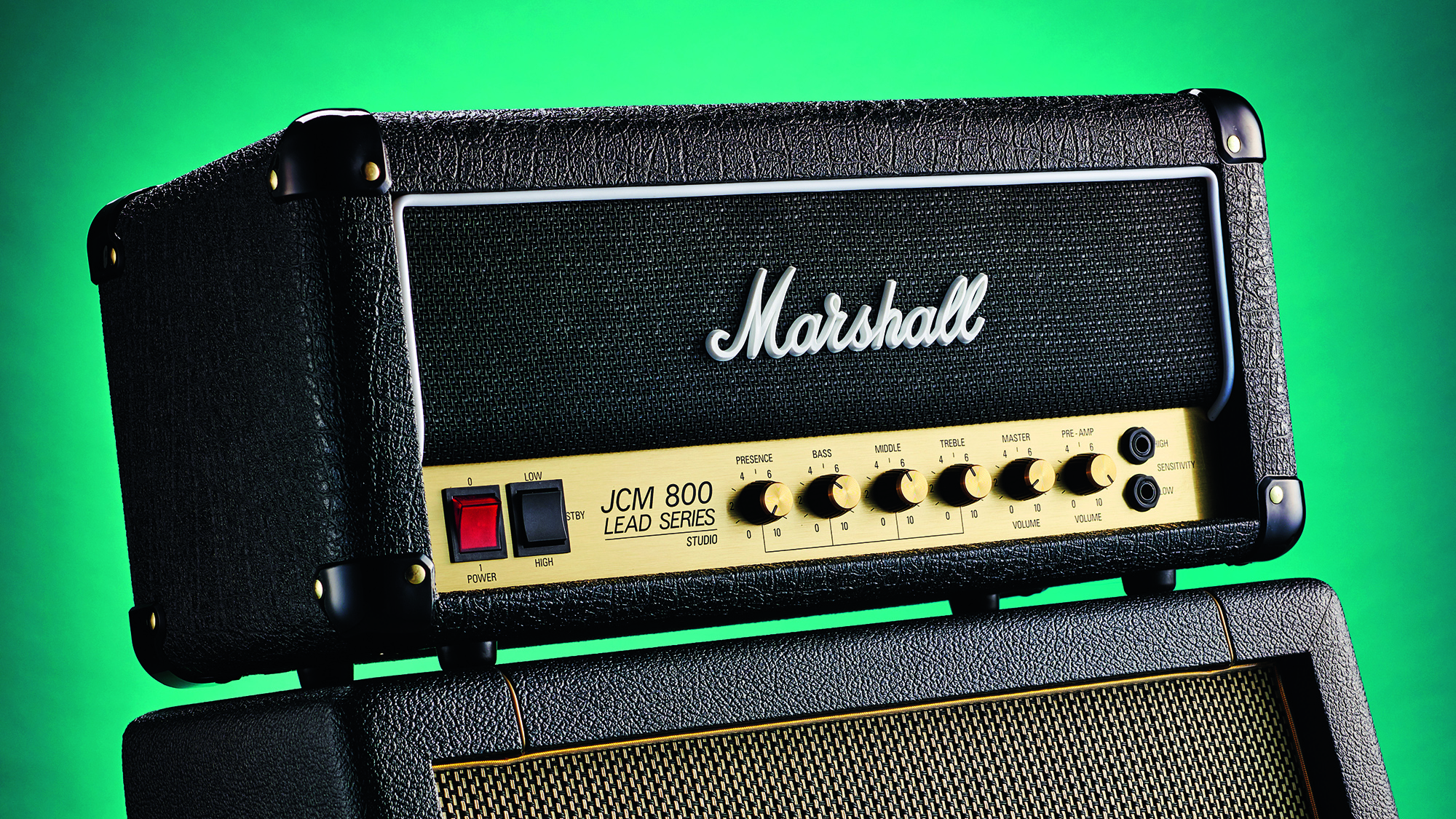“The Kennedy Center thing was a wild experience – being around that many famous people and shaking Robert DeNiro’s hand at the White House”: How Goose took flight to become the world’s hottest jam band
![Goose’s Rick Mitarotonda [left] and Peter Anspach at NYC’s Radio City Music Hall, June 25, 2022](https://cdn.mos.cms.futurecdn.net/tUcaeZE77iRm3AJSfFSZkK.jpg)
All the latest guitar news, interviews, lessons, reviews, deals and more, direct to your inbox!
You are now subscribed
Your newsletter sign-up was successful
Goose has been the fastest-rising act in the jam band universe over the past few years and is poised for blast-off with the release of their fourth studio album, Everything Must Go.
Their summer tour will include their first headlining show at New York City’s Madison Square Garden, where they performed last November for the Soulshine benefit concert for hurricane relief along with the Dave Matthews Band, the Warren Haynes Band and Nathaniel Rateliff & the Nighsweats.
Lead guitarist Rick Mitarotonda has emerged as a new guitar hero, his playing clean and concise while always seemingly ready to explode in fast-fingered flights of fancy.
Formed in Connecticut in 2014, Goose began to gain steam five years later when a performance on the smallest stage at the 2019 Peach Music Festival in Scranton, Pennsylvania, raised their profile as a video of their excellent set went viral.
They were primed to take off when the pandemic shuttered the touring industry in early 2020. Instead, the group focused on streaming live shows and completing their second album, 2021’s Shenanigans Nite Club.
After its release, the group started playing ever-larger venues, including Radio City Music Hall for two 2022 shows, during which they were first joined by auteur Father John Misty, then Phish’s Trey Anastasio.
Later that year, they toured with Anastasio’s solo band, and in January 2023, they were a special guest at Dead & Company’s Playing in the Sand Festival, where Bob Weir joined them on stage. Their acceptance by their own heroes came fast and furiously.
All the latest guitar news, interviews, lessons, reviews, deals and more, direct to your inbox!
“It’s totally surreal,” says guitarist/keyboardist Peter Anspach. “Being a part of this scene is a dream come true, and having the guys we watched in high school ask if we want to play music with them still doesn’t feel real. We’re just learning to enjoy a very interesting new reality while trying to stay focused on following our own direction and path.”
While Phish and Umphrey’s McGee are Goose’s most clear inspirations, their music has continued to evolve its own distinct sound, much of it centered around the improvisational interplay between Mitarotonda and Anspach.
Onstage, the quartet, completed by bassist Trevor Weekz and drummer Cotter Ellis, engage in conversations that move the music through sequences that dabble in loops and electronica (percussionist Jeff Arevalo appears on the new album, but he left the band after its completion).

Mitarotonda’s songwriting also bears the influences of modern singer/songwriters like Father John Misty and Bon Iver while also sometimes displaying some pop sensibility as on Give It Time, the first single off of Everything Must Go, which follows a path set by Hungersite from 2022’s Dripfield.
Mitarotonda says Give It Time was an easy choice as a lead tack.
“It felt like an anthem about the changes we were going through,” he says. “It’s a song that had been floating around for a while half-finished and never quite found a home. When we tried it again, it fell into place quickly and felt like a statement about everything we had been going through and who we were as we re-emerged.”
You guys came out of the pandemic with momentum. Like Billy Strings, you somehow grew during a very difficult time for touring musicians.
Peter Anspach: “It gave us a chance to catch up to the growth that was already happening. We were about to go out on our first sold-out headlining tour in April 2020, and suddenly we were frozen. We hadn’t put out an album in three or four years, and what we were working on was taking forever because it’s hard to finish in between so much touring. The pandemic gave us a chance to finish Shenanigans Nite Club and catch up to thinking about the pieces that we needed to take the next step.
“We got our ducks in a row in terms of support crew, hiring a tour manager and figuring out how to tour on a bus. There’s so much that goes on behind the scenes that we had no experience in, and everything was moving a million miles per hour. It was very good to slow down, catch up and get on our feet when everything came back – and to have really focused on an album we felt great about touring behind.”
You toured with the Trey Anastasio Band last year, and he sat in with you pretty often. Did you have much chance to talk to him about handling growth, or just about guitar playing?
Rick Mitarotonda: “We talked about a lot of stuff and it was amazing. He was very gracious, and he was very open and excited about getting to hang and talk with us throughout that whole tour. He’s a beautiful, charismatic guy and has a lot of funny, awesome stuff to say and some really valuable things that he wanted to get across to us.”
Anspach: “Hanging out with Trey for two weeks was sick. He imparted so much wisdom and told a lot of stories about how things got out of control backstage for them, and there was too much partying going on, and everything spiraled and put the band in a very bad place at the end of the ’90s. Hearing that from him was a blessing because you don’t often get that kind of wisdom and advice from somebody you look up to. It was one of the most special tours ever.”
Bob Weir also played with you – and Rick, you were part of the band honoring the Dead at the Kennedy Center last December. Can you describe what it’s like to be embraced by your heroes and role models?
Mitarotonda: “The Kennedy Center thing was a wild experience, just being around that many famous people and shaking Robert DeNiro’s hand at the White House. The whole thing was just surreal. I was just taking it in and observing all these interesting and wild people, many of whom have been in my consciousness and in the news my whole life.”
I saw the way they were rolling and missed that vibe of hanging out with your homies and the fire and excitement of making music together out of pure exploration and excitement
Rick Mitarotonda
Rick, Peter is a great asset, filling the role of two guys as guitarist and keyboardist. When did you realize the power of that versatility?
Mitarotonda: “Before Peter joined, we had a couple other very strong, well-trained keyboard players. We were going through changes and crossing paths with Peter and his band Great Blue, in which he played only guitar.
“They opened for us in North Carolina, and seeing their vibe really impacted me. They were friends from high school, while I had gone this other route of going to Berklee and putting together this well-trained ensemble where the chemistry was always a struggle. I saw the way they were rolling and missed that vibe of hanging out with your homies and the fire and excitement of making music together out of pure exploration and excitement.
“Meanwhile, we were kind of falling apart and I didn’t know what to do at this clear turning point. I was on an exercise bike in my mom’s garage and I had a vision that Peter should join the band. It didn’t make any sense: he’s a guitar player, he’s the leader of his own band… but it just stuck with me.”
![Goose: [from left] Peter Anspach, Rick Mitarotonda, Trevor Weekz and Cotter Ellis](https://cdn.mos.cms.futurecdn.net/TNgLM7afzFYdLbU9XiPs9L.jpg)
“We went on a hike and talked about it more and he was on board, so we gave it a shot, based on chemistry, not a plan. His first gig with the band was Goosemas, December 2017, and the next month we had a run opening for Spafford, which was the hottest up-and-coming jam band. The tour was by far the most intense thing we had ever encountered, so after a week with Peter, it was like we were all in boot camp.
“Peter and I were in the infancy of building our little world and we absorbed a lot about each other and also how Spafford was doing things. Then we really got to work after that building what we wanted to build.”
Was it immediately apparent how well it was going to work?
Mitarotonda: “Kind of. I was just excited to have someone to run with. I imagined like the Green Berets scaling a wall with a knife in their teeth. In a band there’s different roles that need to get filled, and I was just thrilled to have another person on the front lines with me.”
Peter, most guitarists who make it to this point have such a bond with their instrument, like it’s part of their arm. Do you have that with both instruments, or does one kind of come first in your brain?
Anspach: “Good question! One thing I know for sure is that I could feel comfortable taking a guitar into almost any situation, but if you threw me and some keyboards on stage with a jazz band, I’d be a little stunned. But I love piano, which I think is the ultimate instrument, because you can do so much on it. I also love clavinet and organ – and I love playing bass!
“During a show, I’m just reading the room and the feel, figuring out what to play based on every moment, and trying to be free and flowing about it. If I took the attitude that I’m truly a guitarist just adding some key parts, then I’d miss a lot of the important moments where switching to a keyboard can really elevate the jam or the song.
“I was more like that when I joined the band, but a big part of my evolution has been learning to let go of labeling myself, existing in the moment and trying to be as musical as I can at every junction.”
Rick, it’s interesting what you said about different ways of putting bands together. Is that an overall criticism of that Berklee music-school approach?
Studying music too much can be a thing, and I had to fight to get back to the reason why I play
Rick Mitarotonda
Mitarotonda: “I don’t have any formal criticism of that approach or that school because some people thrive in that environment. But while I learned a lot there, it wasn’t the most creatively conducive or nurturing environment for me. It challenged my connection to my own creativity and music, and I’m not alone. I tested higher than I should have when I entered and got thrown into some difficult courses, including a Brazilian jazz ensemble where everyone was playing circles around me.
“The other guitar player was on fire, just crushing. He knew so much more than I did and had so much more ability than I did. A few years later I ran into him, figuring he must be doing incredible stuff, and he said, ‘I don’t play guitar anymore.’
“Wow. He was DJing at the club! Studying music too much can be a thing, and I had to fight to get back to the reason why I play. I never want to move away from just loving playing guitar and making music with my band.”
- Everything Must Go is now out via No Coincidence.
- This article first appeared in Guitar World. Subscribe and save.
Alan Paul is the author of four books, including Brothers and Sisters: The Allman Brothers Band and the Inside Story of the Album That Defined '70s as well as Texas Flood: The Inside Story of Stevie Ray Vaughan and One Way Out: The Inside Story of the Allman Brothers Band – both of which were both New York Times bestsellers – and Big in China: My Unlikely Adventures Raising a Family, Playing the Blues and Becoming a Star in Beijing, a memoir about raising a family in Beijing and forming a Chinese blues band that toured the nation. He’s been associated with Guitar World for 30 years, serving as managing editor from 1991 to 1996. He plays in two bands: Big in China and Friends of the Brothers (with Guitar World’s Andy Aledort).
You must confirm your public display name before commenting
Please logout and then login again, you will then be prompted to enter your display name.







